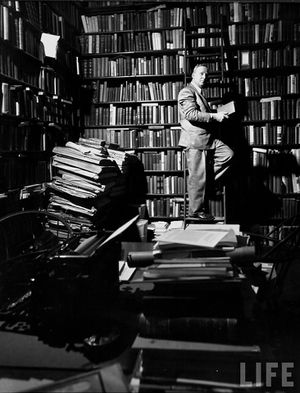Allan Nevins
- See also Wikipedia's article about "Allan Nevins".
Allan Nevins (1890-1971) was a historian and journalist who was prominent in Civil War history. He also famously wrote biographies of President Grover Cleveland, Hamilton Fish, Henry Ford, and John D. Rockefeller, among others. He died in California in 1971.
Early Career
Nevins earned a BA in English from the University of Illinois in 1913. He then worked in New York City as a journalist until his appointment to faculty at Columbia in 1929.
Columbia Career
After joining the faculty at Columbia, Nevins was quick to make an impact. He was named DeWitt Clinton Professor of American History in 1931. In 1948 he created the first institutional oral history program to operate on a regular basis in the United States; the Columbia University Oral History Research Program continues to operate today, including recently helping to record experiences of survivors of the September 11th disaster.
Nevins also produced an impressive body of work at Columbia before his retirement in 19??. One area he excelled in was biographies. A coupling of extremely in-depth research and concise, coherent and journalistic prose led to excellent biographies of influential men from the 19th and early 20th Century, including Grover Cleveland, Abram Hewitt, Hamilton Fish, Henry Ford, John C. Frémont, Herbert Lehman, John D. Rockefeller, and Henry White. In the majority of cases, Nevins' accounts remain unequaled in scale and quality.
He also wrote one of the two definitive accounts of the American Civil War in the slightly Union-biased Ordeal of the Union (The counterpart is Shelby Foote's slightly Confederate-biased The Civil War: A Narrative, published in 1990). Nevins is probably most famous for this work. He worked on it from 1947 until his death in 1971.
His journalistic style of writing history has influenced subsequent historians, including Jean Strouse, Ron Chernow, David Nasaw, and T. J. Stiles.
Other Accomplishments
He was appointed Harmsworth Professor of American History at Oxford University twice, from 1940 to 1941 and from 1964 to 1965.
He was president of the American Historical Association in 1959.
